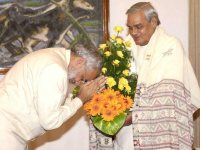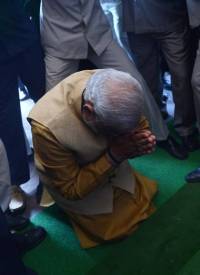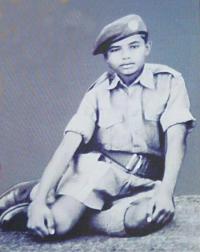The turning point in Indian politics – by Tufail Ahmad
 “It is historically extraordinary that Modi was born in the year (1950) in which the people of India gave themselves the Constitution, a politically enforceable document of Enlightenment ideas: liberty of thought and expression, free press, religious freedom, individual liberty, equality, rights to form parties and vote. Born after Independence, Modi is a product of Indian democracy, both by experience and education, being a graduate in political science. He represents a new species of democratic Indians: 50 per cent of India’s 1.2 billion people are below 25 years of age; 65 per cent are below 35. This is essentially a new political population, raised in freedom, birthed by Enlightenment.” – Dr Tufail Ahmad
“It is historically extraordinary that Modi was born in the year (1950) in which the people of India gave themselves the Constitution, a politically enforceable document of Enlightenment ideas: liberty of thought and expression, free press, religious freedom, individual liberty, equality, rights to form parties and vote. Born after Independence, Modi is a product of Indian democracy, both by experience and education, being a graduate in political science. He represents a new species of democratic Indians: 50 per cent of India’s 1.2 billion people are below 25 years of age; 65 per cent are below 35. This is essentially a new political population, raised in freedom, birthed by Enlightenment.” – Dr Tufail Ahmad
For thousands of years, people have prostrated at temples across India, but perhaps for the first time in India’s history on May 20 a new member of the human species walked up, knelt down in prayer with folded hands and touched his forehead to the footsteps of Parliament, a political institution created by reason and essentially not a religious place of worship. Few can grasp the symbolism of Narendra Modi’s prostration, but his act signifies a democratic revolution of mind that Indian people are going through.
While there are concerns about the sectarianism of the Rashtriya Swayamsevak Sangh where Modi lived his adult life, what is not in doubt is its role in defending democratic values during the Emergency, a period during which Modi struggled alongside Gandhians, communists, liberals and Muslims to reclaim liberty for all. Modi told his biographer Andy Marino that “the democratic values that I found” during the anti-Emergency struggle became “a part of my DNA”; he explained: “I became aware; I understood the Constitution, I understood the rights, because before that I was living in a different world. The Emergency became a university for me.”
Democracy creates new worlds. As a model of politics, it equips tea boys like Modi with ambition to achieve the impossible. Democracy emerged during the 5th-4th centuries BC when the demos (people) of Athens revolted against their tyrants and established their own kratos (rule). For the next 2000 years, democracy was lost until an underground intellectual movement of ideas, known as Enlightenment, germinated through the 16th-19th centuries, giving birth to the American and French revolutions, reinventing democracy. Enlightenment, writes Jonathan Israel in Revolution of the Mind, was “quintessentially defined by its insistence on full freedom of thought, expression, and the press, and by identifying democracy as the best form of government”.
It is historically extraordinary that Modi was born in the year (1950) in which the people of India gave themselves the Constitution, a politically enforceable document of Enlightenment ideas: liberty of thought and expression, free press, religious freedom, individual liberty, equality, rights to form parties and vote. Born after Independence, Modi is a product of Indian democracy, both by experience and education, being a graduate in political science. He represents a new species of democratic Indians: 50 per cent of India’s 1.2 billion people are below 25 years of age; 65 per cent are below 35. This is essentially a new political population, raised in freedom, birthed by Enlightenment.
If the Emergency became a university of democracy for Modi, new Indians are debating democratic values and ideas of Enlightenment through television in slums and villages, newspapers in towns and trains, Twitter and Facebook on mobile phones. Leaders who can read a nation’s political mind win. Modi understood the youth who put up their vote-inked fingers for selfies and television cameras to assert power and became his trolls. India needs 10 million jobs a year for its youth to realise their aspirations, which Modi translated into a national development agenda: to build 100 smart cities, broadband to villages, bullet trains, and toilets before temples. “I want to see you, laptop in one hand, Quran in the other,” Modi told Muslims.
“Enlightenment philosophers,” writes James MacGregor Burns in his book Light and Fire, “moved attention to human beings as the measure of all things.”Modi comprehended that people alone mattered, a characteristic of Enlightenment. Over past decades, democracy empowered millions of lower castes but when caste became irrelevant, it is downsizing sectarian leaders like Mulayam Singh Yadav, Mayawati and Lalu Prasad Yadav.
Having grown up in democracy, Modi knew that it destructs archaisms like caste and secularism and reorders societies for all. While the Congress was luring Muslims through the divisive politics of quota, Modi put Indians on an inclusive agenda through his substantive politics of India First.
Democracies destruct despotisms and hereditary rule, which the Congress didn’t understand but Modi did from Day 1 when he launched his campaign by targeting shehzada (prince) Rahul Gandhi, a direct attack at the gravity of hereditary power. In the post-Enlightenment era, heredity is an uncivilised principle of government formation. The Congress may return to power, but Indian democracy will not accept a ruler in inheritance. A Congress leader blamed Mossad for the Congress’ rout, but Congressmen must remember that a politics that cannot grasp the sweep of democracy will not succeed.
Modi is also a good reader of India, the core of which is shaped by the overriding factor of consensus, a point A. B. Vajpayee understood and L. K. Advani didn’t throughout the divisive Ayodhya politics. Unlike Advani, Modi comprehended the entirety of India, remembering to visit Vajpayee before and after the election campaign. In computer programming, a destructor is something that is automatically triggered to cleanse objects whose lifetime has expired or are unnecessary, thereby freeing up resources. If India were a computer programme, Modi was automatically triggered as a destructor, having decoded that divisive politics is unwanted now. Modi’s victory buries an era of bitter politics of secularism, casteism and regionalism, also proving that the period of coalition governments was a bend in the road of Indian democracy.

Indians will retain identities as Hindus, Muslims, Tamilians, Bengalis or others, but democracy is the outstanding factor that defines Indian society’s general will generated from differences, unlike in the past when consensus emanated from similarities of beliefs and identities. Burns also writes: “Enlightenment empowered the human mind for new worlds of liberty and self-government.” Indian democracy has reached a turning point where no leader or party can turn the wheel back, and Modi, too, shall become irrelevant should he fail Indians. Democracies are also facing threats from: one, organised groups that threaten the unorganised like those living in slums; two, corporate houses that influence the media and politics excessively; three, big governments that intrude into citizens’ lives; four, masses’ unnecessary adoration of leaders, which necessitates that Indian youth must identify with people, not with leaders or parties. – The New Indian Express, 26 May 2014
» Tufail Ahmad is director of South Asia Studies Project at the Middle East Media Research Institute, Washington, DC. Email: tufailelif@yahoo.co.uk
Source :
http://bharatabharati.wordpress.com/2014/05/27/the-turning-point-in-indian-politics-tufail-ahmad/





锘縤pe de dirigeants uti chaussures timberland travail lisent’ Produits sur le r&233;&233;quilibrage de la main ‘Pour spellout tr&232;s terribles conclusions qui peuvent &234;tre tout &224; fait un signe pour montrer au-dessus de la t&234;te que vous souhaitez, vous pouvez dans un mouvement additionnel,
Absolument, vous pouvez remarquer artificielle &233;duquer et sacs &224; main en raison d’un kilom&232;tre de la culture. Malheureusement que les administrateurs Web sosies sont incontestablement vous trouvent acqu&233;rir beaucoup mieux beaucoup plus mieux &224; reproduire des solutions initiales d’accouchement la marque locomotive. Les consommateurs potentiels est n&233;cessaire pour &234;tre n.
Rep&233;rez un ou deux inconv&233;nients &224; l’homme fait des id&233;es pendant la journ&233;e. On est quand vous &234;tes expos&233; &224; une lumi&232;re ensoleill&233;e et portable tout d’un coup peut juste subir imm&233;diatement une perte de ce que vous pouvez faire pour voir pendant la nu timberland 7 eye chukka it. Il s’agit de la r&233;ponse qui transpire est capable de durcir plus rapidement que cela n&233;cessite de toute fa&231;on &224; g&233;n&233;rer.&65279;4. chaussures de sport des avantages Cole Haan ‘Calhoun’ timberland earthkeepers boat shoe OxfordsThe ‘Calhoun’ D&233;corer oxford muscle cisaillement bas&233;es cuir tu&233; qui est enti&232;rement en couches. Tout aussi puissant en tissu noir et / ou &233;ventuellement tissu acajou, ces baskets ne sont pas tous les extras, autres que celles pr&233;vues au charme, En cons&233;quence, ils sont une pr&233;f&233;rence personnelle &233;tonnamment simple &224; couplage avec le meilleur rencontrent ou pantalon de costume,
Parall&232;lement &224; cela, Toute la structure de la retraite est rest&233; enti&232;rement financ&233; pour un taux de PCGR qui offre beaucoup plus d’ind&233;pendance sur le march&233;. Associ&233;e &224; un plus rachet&233; 1,1 million explique le remplissage &233;tablie sur la vue t&233;l&233;spectateurs deuxi&232;me trimestre r&233;elle de gagner 24 M $. Maintenant,
http://lawpro.vn/css/Timberland.php?chaussures-timberland-enfant-p-379.html
http://www.christ-schmuck.com/
http://lawpro.vn/css/Timberland.php?chaussures-timberland-femme-p-125.html